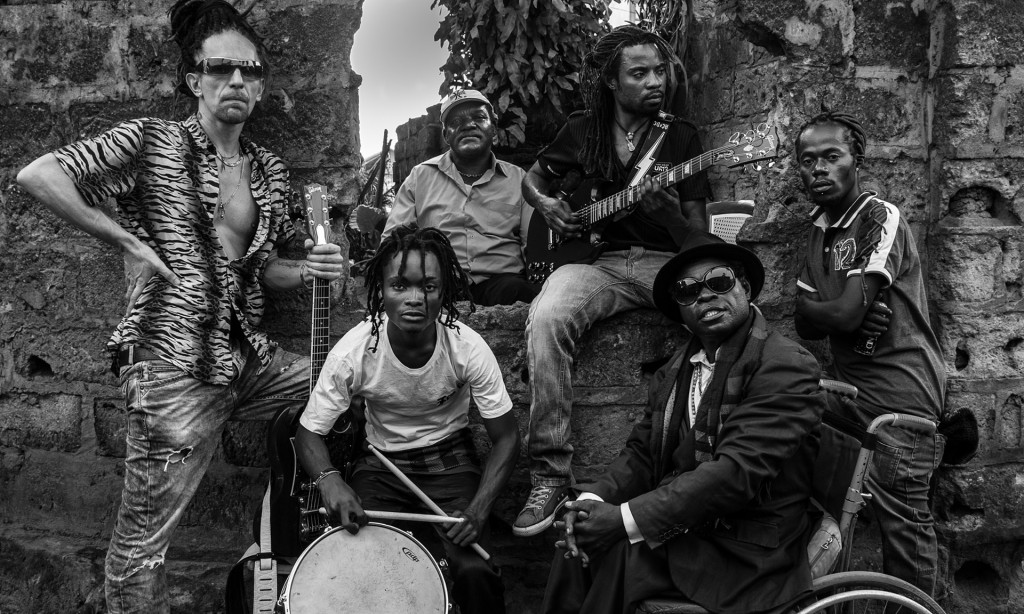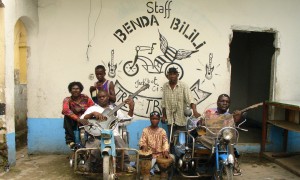I fell in love with African pop music long ago, in Nigeria, during the heady days of Victor Owaifo, Dele Abiodun and King Sunny Adé (whose hand I got to shake in Toronto, many years later). I’ve tried to follow it ever since, but there is simply too much to keep track of. Africa produces wave after wave of new music, the hotspots shifting back and forth from region to region. Kinshasa is a hotspot, lately.
Mbongwana Star is taking African pop in a new direction with the release this year of From Kinshasa. Mbongwana actually means “change” in Lingala, and the change is apparent. Musicians in the Congo* have long been in a groove whose outside influences were primarily reggae, soukous and classic rhyhm and blues. From Kinshasa is quite different. It has a spacy, almost psychedelic sensibility that pulls influences from punk and electronica, and has an ambience something like the science fiction-motown experiments that George Clinton made back in the 1970s. This amount of innovation is all the more remarkable because the founders of the band, Yakala “Coco” Ngambali and Nsituvuidi “Theo” Nzonza, are men in their sixties, confined to wheelchairs, and veterans of the brief celebrity of Staff Benda Bilili.
Staff Benda Bilili was a freak success a few years ago. It emerged from the slums of Kinshasa, and was comprised of four elderly men who had been confined to improvised tricycle-wheelchairs by childhood polio, accompanied by a teenager who played an electric lute that he had hand-made from scraps. They appeared peripherally in a French documentary on Kinshasa’s slum life and music scene called Jupiter’s Dance in 2006. Four years later, the same producers and directors made a slicker documentary focused on them, which was a hit at Cannes and made them overnight stars in Europe. What followed was the classic tragicomedy of instant success. They toured the world, giving hundreds of concerts, released two fine albums, Très très fort (2009) and Bouger le Monde! (2012). They made a fortune on paper, but the money evaporated in the unfamiliar maze of contracts, hangers-on, per diems, and touring costs that plague the global music industry, and which they were unequiped to navigate. At one point, they found themselves penniless in Trinidad, with no gig, no place to stay, and no airfare home. Finally, the band broke up with the usual confusion and rancour. But the two albums they issued are fine examples of the Kinshasa sound, lively and entertaining.
Ngambali and Nzonza did not give up, however. They returned to Kinshasa and dug up some young musicians back in their old neighbourhood. They found percussionist Randy Makana Kambalaya in a shelter for the disabled, a young street urchin known only as “Sage” who played vibes, and Jean-Claude Kamina Mulodi, a brilliant guitarist. Mbongwana Star was born, and they were open to new musical influences, for the Staff Benda Bilili veterans had been exposed to a lot of stuff in their world tour, and absorbed it with interest. Connecting with an experienced Irish producer, Doctor L, familiar with the African scene but also savvy in the music business, put them back on track. While the two earlier albums are good stuff, worth repeated listening, From Kinshasa is something entirely new, and I’ve been playing it over and over again with pleasure.
— * the former Belgian Colony, previously called Zaire, not the Congo Republic, a former French colony next door to it.


0 Comments.